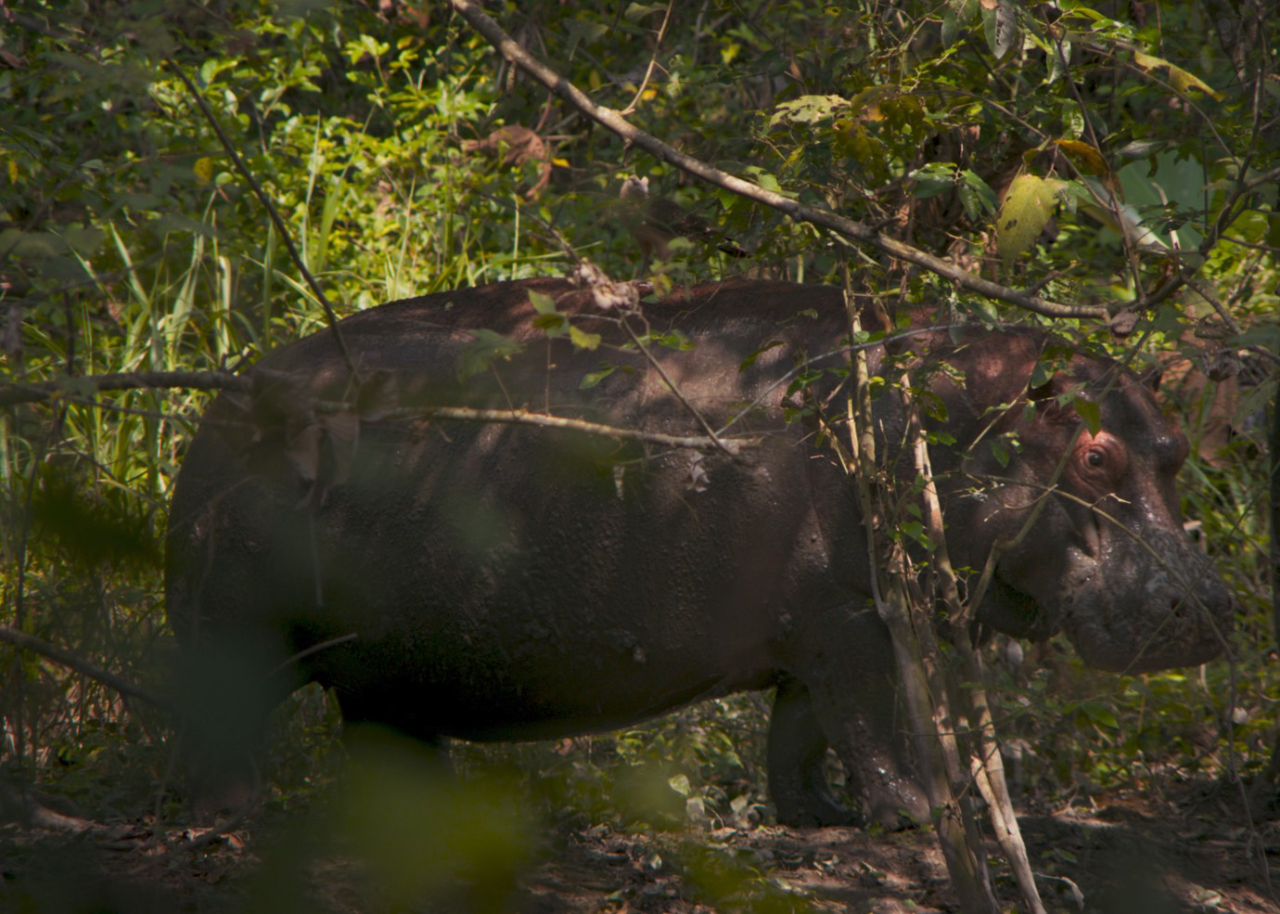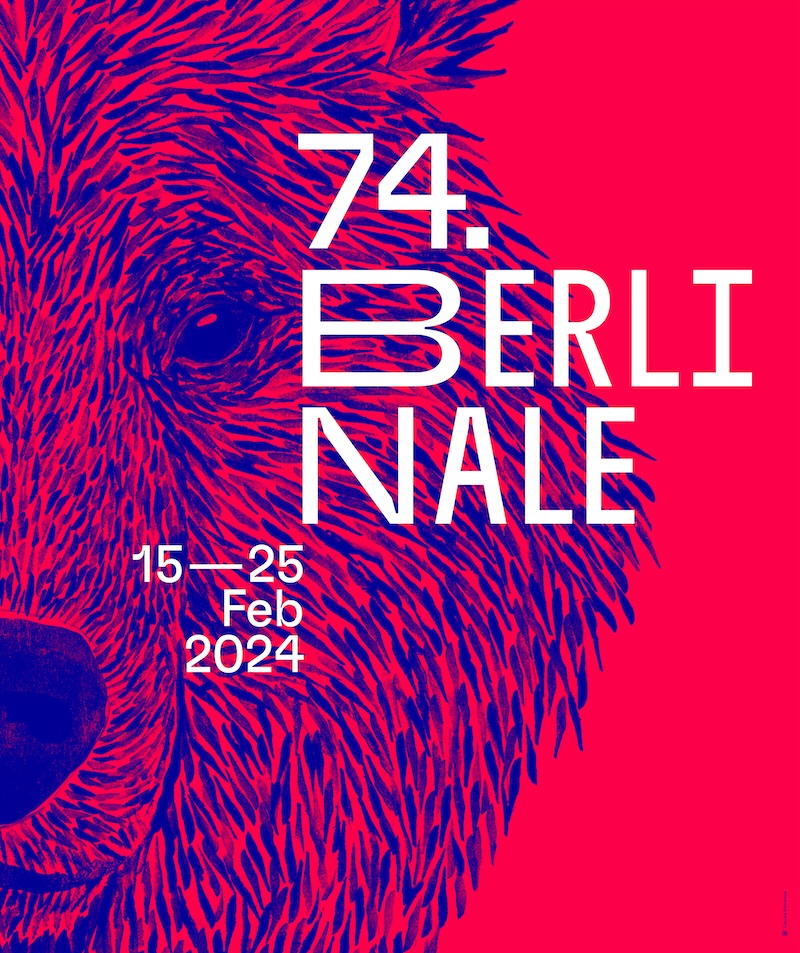“Cinema produces subjectivity – it’s not homogenised”: Nelson Carlos De Los Santos Arias on Pepe at Berlinale 2024

There was a strange moment at the Berlinale press conference for Pepe, in which director Nelson Carlos De Los Santos Arias was asked about previous comments he made that compared Pepe the hippopotamus in his film to the white whale in Moby Dick. The trouble is that the filmmaker didn’t remember saying anything like this… because he’s never read Moby Dick.
The movie itself is a brilliantly distinctive, often weird, and occasionally surreal story detailing the adventures of a hippo called Pepe as he explores both the Colombian countryside and the meaning of existence. We spoke to the filmmaker ahead of his world premiere at the 2024 Berlinale.
So you definitely haven’t read Moby Dick?
That was amazing, that was amazing. I actually never read Moby Dick. I don’t know, I mean like, should I? Did you read it?
Nope.
Okay, now I’m interested. Do you know what? I like to read – I read a lot – but I like to read in Spanish. I like Latin American writers a lot and there are so many that are so good. I listened to all types of music from all over the place, cinema from all over the place, and of course I have read literature from all over the place. But this literature is the only thing that, somehow, I keep too much to my region – not because of political reasons or nationalism, which is crap. It’s something that gives me joy to read the stories from Bolivia, and you know, and all these places. I’m in love with Latin America, and it’s through its literature. But yes, maybe one day I’ll read Moby Dick. I’ll tell you. I’ll call you.
You started working on the film while studying here in Berlin. Did the city influence you at all when writing the story of a hippopotamus in Colombia?
Definitely, and especially in the sound landscape of the film – the sounds that I heard here from experimental music, from acoustic music, from experimental dance music. You know, it was a place that gave me the strength and the courage to take my sound design to another level. I come from experimental film, so I’ve always been very transgressive, but I think like my time here (in Germany), and especially in this residency – I never had the opportunity, I mean, I don’t come from a rich family, so to be in an apartment, an incredible apartment, and I didn’t need to work, like, they would just give me money, and I was able to hire a particular professor. So, my God, then going out – I believe I know a lot about music; I’ve listened to music all my life. Melómano, no? I don’t know if that is just a Spanish thing, someone that is addicted to melodies. For me, it’s incredible that I know about it going to places from time to time, I said, “What the hell is that beat?” and everybody else was completely like, “Whooooa,” and I was just listening, writing, I was also using my phone all the time – like listening, not to find out like, “Oh, who did this (song)?” It was more like an understanding, like noises. I mean, I’m not interested in making music but I was interested in creating a sound landscape that was complex, and I think Berlin was not only in this film – I hope that I will continue to have a relationship with Berlin, because for me it’s a place that that concentrates great ideas in music, and this is very important to me.
In addition to directing the film, you wrote it, produced it, edited it and were the co-sound designer. When it comes to making a movie, are you a control freak?
That has a kind of a boring answer. It’s not a boring question, but a boring answer. It’s always that people don’t ask that question, and I cannot explain myself, because in cinema, I could see myself as someone that – there’s this thing about collective nascent cinema that is quite beautiful, and I use it as well. But the problem is that I didn’t study cinema in a film school. I studied cinema in art school and it’s a very different pedagogical strategy. Like, when you go to film school, it is divided, like industrially divided, like so you’re all together for one year but then you go to cinematography, the other person goes to whatever. Because in the end, the big difference between these two forms of teaching cinema is that in film school, the result is a product. It could be a product that becomes a commodity in the market, but also a product of communication, right? In the art school, the film becomes an object, so in that pedagogical system, there’s no division. You are schooled to do everything, because most of the time in the experimental films, we’re not doing fiction, we’re not doing narrative, we’re doing small films like on 16 mm. We develop our own process, so this incredible school that I went to, where I did I did my MFA California Institute of the Arts, CalArts, they have incredible professors in all the technical aspects, so you graduate from there knowing everything – cinematography, all the tools, but to make very small films.
Which is a good place to start.
But the problem was that I’m from the Dominican Republic. There’s no experimental film and like there’s no art council that will give you money. The only way that I have to make films is to make narrative films. So I did a film before, Cocote (2017), where I was the director, and it just depressed me – not because of a need to control, but because I felt that my relationship with the production of sound and image would change, and it was not part of my experience of where there is something that has to do with me and the way that I look at things, and this is how I learned how to make cinema. So in Pepe, it was very beautiful of the cinematographers that were involved, they said, “Nelson, don’t worry – I know that we are here to collaborate with you, we love your eye. I mean, we’re here to collaborate.” I was very nervous, but they understood that I was not a control freak. But, man, the only way for me to understand something is to do it. I don’t know how to explain it, because it’s intuitive – you know, about being intuitive.
How did this intuitiveness help the creative process?
This intuitiveness that I have with the territory, with the textures, it’s in the way that I think about images and sounds. Because of course, it’s cinema in the end.
When the Berlinale released their programme for 2024, your film was described as the most unclassifiable film in the festival. Do you agree with that point of view?
There is a motif, and from a political perspective to avoid homogenisation, and this from a decolonial perspective. You know, a decolonial process is not only for people that were born in third world countries. Decolonisation has to happen for the people in Europe, for the people in Africa. We have a system that we are oppressed somehow, an idea of the world that creates a hierarchy, that creates a lot of stuff, right? And part of this imposition is through homogenisation. I think the act of making a film is through heterogeneity, and this heterogeneity has to become an aesthetic somehow. And also because I think we need to school ourselves in a process of decolonisation to see things from varied perspectives, like it’s in heterogeneity that we find tolerance. In homogenisation, we’re finding tolerance. Because you’re not like me, you’re not behaving like me, like us. Sometimes democracy is not democracy in the end; it’s the desire of the majority, but there’s always a minority, you know what I mean? So, yes, I will bring heterogeneity to my film, and I hope it can bring heterogeneity in the way we see and understand the world, and cinema helps us to understand this. Cinema produces subjectivity – it’s not homogenised. I mean, who am I? Who are you? We are many things, and we are fed by culture, family, lovers, social media – all of this stuff. It’s already a heterogeneous world. What about making an aesthetic from that, you know? So yes, it will be unclassifiable.
In doing publicity for Pepe, you’ve talked about your difficulty in casting voice actors to perform the voices of the hippo. You said early versions sounded like Darth Vader or one of the Thundercats. How did you go about finding the final voice cast?
Especially when you don’t know what you want, but you know what you don’t want – which is Darth Vader or the Thundercats, right? In general, my casting process is ridiculously long and tiring, but at the same time, it’s so fun. I think there was a moment when I was going crazy, saying, “Oh my God, what am I going to do?” and so I said, “Stop it, Nelson. Your main source is the hippo.” And I started to listen to a lot of hippo sounds, and I remember sitting with the actors, with each one of them, and we would just start making sounds of hippos ourselves. From there, from this work, this emulation – how do we produce a voice from that? It was actually a beautiful process.
And complicated.
It seems like not a very complicated thing. It was in the sense, how do we, by emulating an animal, how do we create a legit form of communication, which is the voice coming from this animal – and not get an electronic voice? This process, which seems like a simple task, was very hard: technically, for the actors, and also in the decision to say, “Oh, this is good.” To be honest, I was nervous and a little bit insecure even until five months ago, and then when I started to show the finished film, and people were just like embracing the voice, and I said, “Okay, okay… we made it.” It wasn’t easy, it was very difficult. The work of directing actors is very difficult to rationalise or intellectualise, you know, because it’s always present, and it’s in the moment, and there’s kind of a flow. It’s almost like when two musicians try to make jazz.
Like freestyling?
Like freestyling. It’s a little bit difficult, but, yeah, we made it.
Oliver Johnston
Pepe does not have a UK release date yet.
Read more reviews from our Berlin Film Festival 2024 coverage here.
For further information about the event visit the Berlin Film Festival website here.


























Facebook
Twitter
Instagram
YouTube
RSS